Early Signs of Pregnancy: Symptoms Week by Week Guide
Early Signs of Pregnancy: Symptoms Week by Week Guide
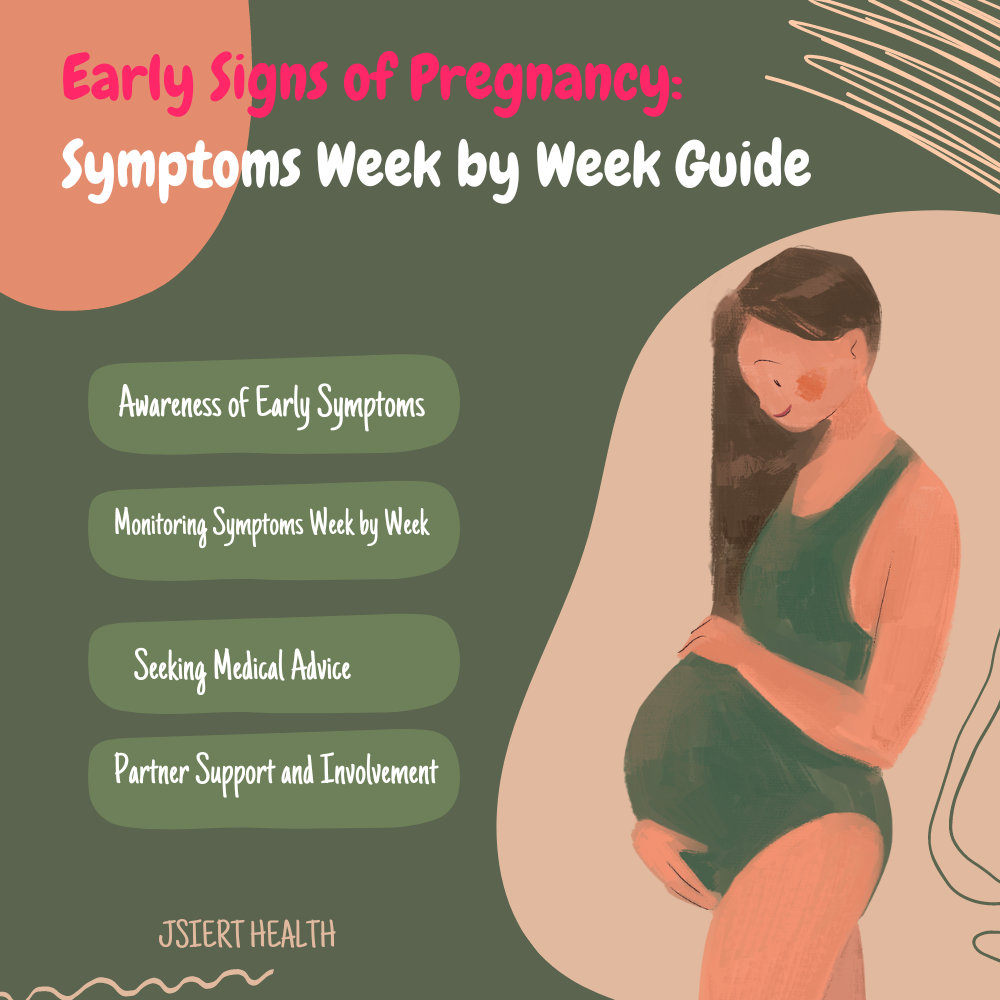
Introduction :
Welcoming a new life into the world is an extraordinary journey, filled with wonder, excitement, and anticipation. Understanding the early signs and symptoms of pregnancy, week by week, is vital for expectant parents to navigate this transformative time with confidence and clarity. In this guide, we’ll take a simple and clear approach to exploring each stage of pregnancy, highlighting the subtle changes and milestones along the way.
Pregnancy is an incredible journey, but it can also be overwhelming, especially for first-time parents. That’s why we’ve created this guide—to provide you with straightforward information that’s easy to understand. From the earliest signs of conception to the development of your growing baby, we’ll break down each week into manageable steps, helping you feel more prepared and informed as you embark on this remarkable adventure.
Whether you’re experiencing the first whispers of pregnancy or eagerly anticipating the arrival of your little one, this guide is designed to be your companion along the way. By outlining the signs and symptoms of each week in clear, simple terms, we aim to empower you with the knowledge and confidence needed to embrace every moment of this extraordinary journey.
Week 1: Conception and Implantation
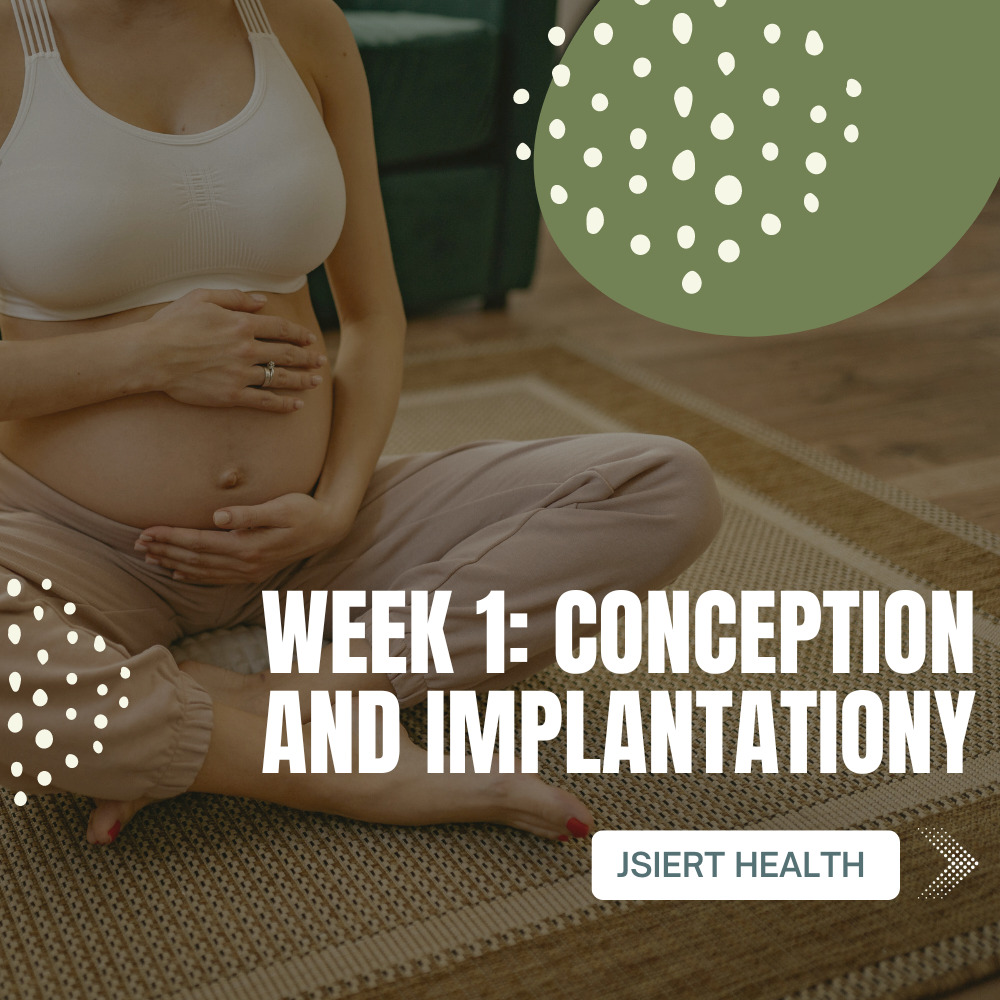
- Conception:
- During Week 1, conception occurs when a sperm fertilizes an egg in the fallopian tube.
- This marks the beginning of your pregnancy journey as the fertilized egg, known as a zygote, is formed.
- Implantation:
- Following conception, the zygote begins its journey towards the uterus for implantation.
- Implantation is the process where the fertilized egg attaches to the uterine lining, preparing for further development.
- Physical Changes:
- Typically, no noticeable physical changes occur during Week 1.
- However, internally, the process of conception and implantation sets the stage for the pregnancy journey ahead.
- Importance of Tracking:
- Understanding the timing of conception is crucial for tracking the progression of pregnancy.
- This knowledge helps in determining future milestones and expected changes in the coming weeks.
- Emotional Aspect:
- Week 1 is filled with anticipation and hope as you embark on the journey of creating new life.
- It’s a time of excitement as you lay the foundation for the miraculous journey of parenthood.
Week 2: Early Hormonal Changes
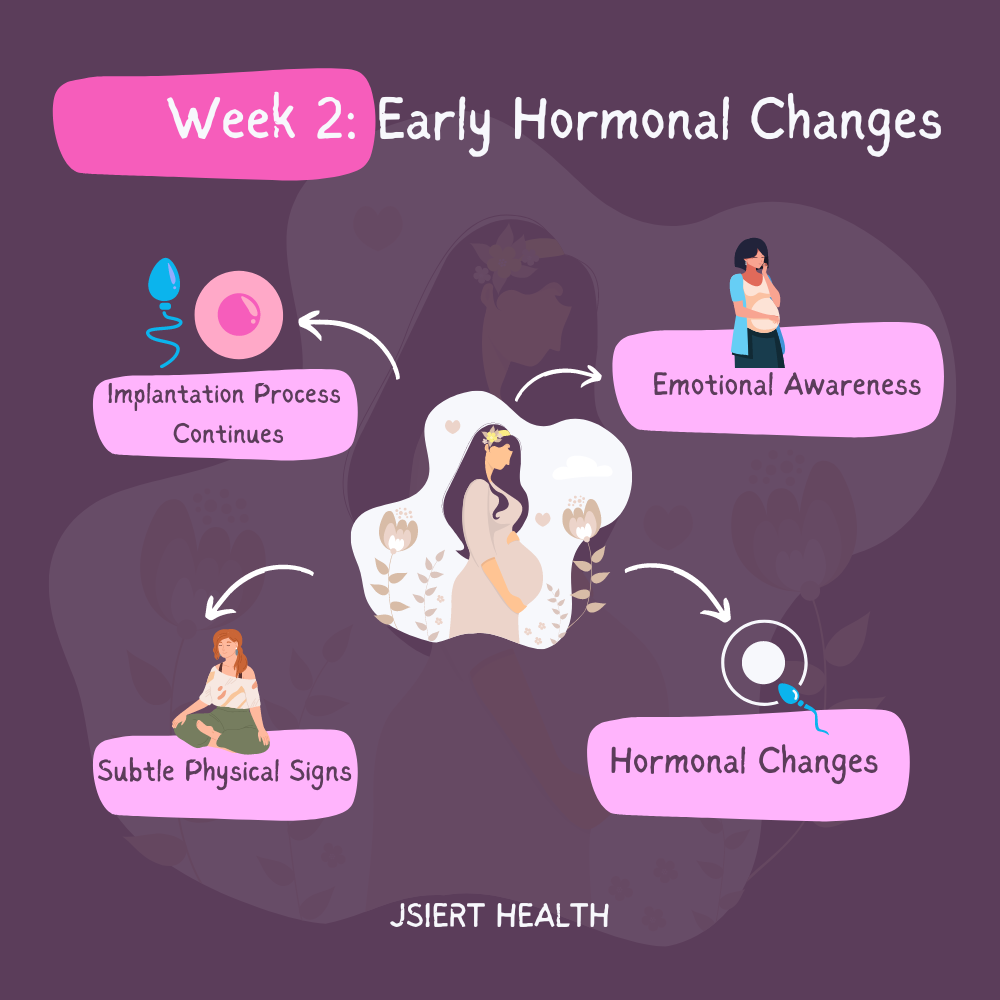
- Implantation Process Continues:
- During Week 2, the blastocyst, formed from the fertilized egg, continues its journey towards the uterus for implantation.
- Implantation involves the attachment of the blastocyst to the uterine lining, a crucial step in the early stages of pregnancy.
- Hormonal Shifts Begin:
- Hormonal changes start to occur, particularly with the onset of increased production of human chorionic gonadotropin (hCG), known as the pregnancy hormone.
- These hormonal shifts play a vital role in supporting the early stages of pregnancy and preparing the body for further development.
- Subtle Physical Signs:
- While physical symptoms may not be pronounced during Week 2, some individuals may experience subtle signs such as mild cramping or spotting as the embryo implants.
- These early indicators may vary in intensity and duration from person to person.
- Importance of Hormonal Changes:
- Understanding the hormonal changes occurring during this stage is crucial for recognizing the early signs of pregnancy.
- Increased levels of hCG play a significant role in confirming pregnancy through home pregnancy tests or medical screenings.
- Emotional Awareness:
- Week 2 may bring about heightened emotional awareness as individuals navigate the anticipation and uncertainty of early pregnancy.
- It’s essential to acknowledge and address any emotional fluctuations with support from loved ones or healthcare professionals.
Week 3: The Beginning of Gestation
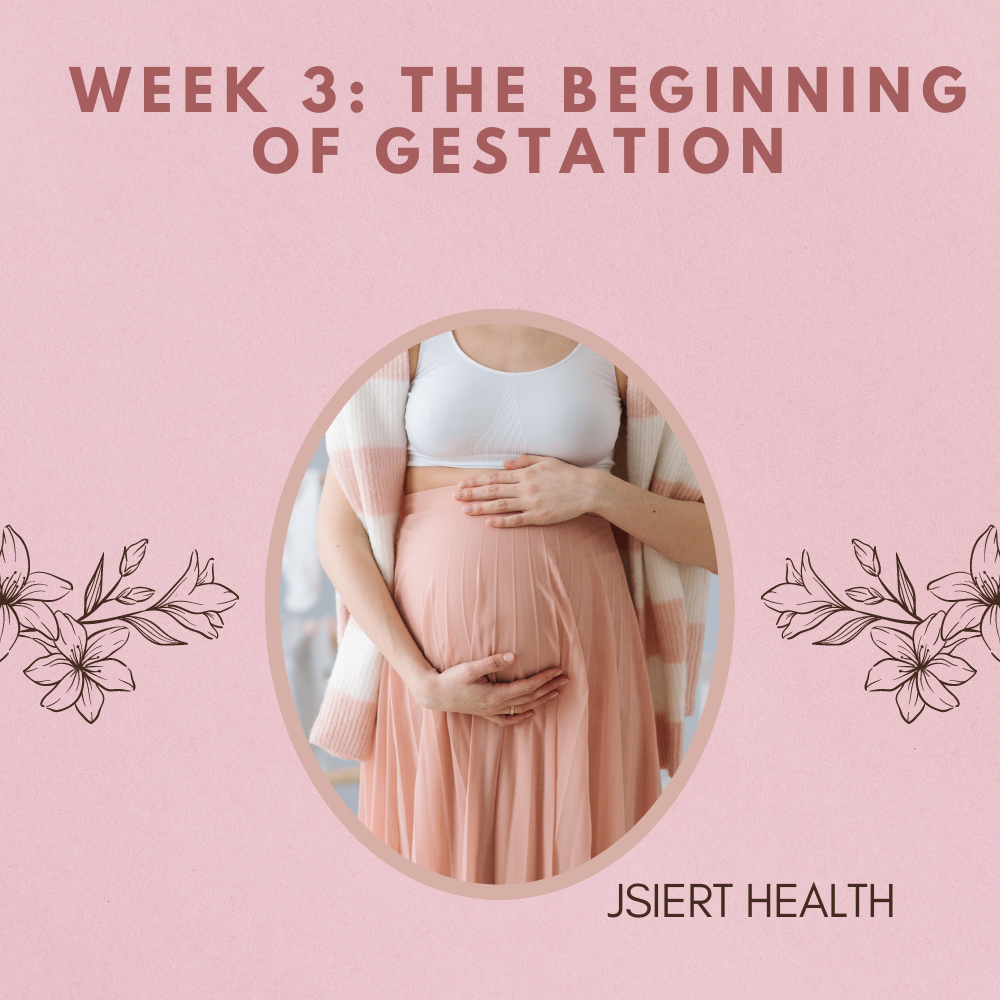
- Embryonic Development:
- Week 3 marks the early stages of embryonic development, as the blastocyst continues to grow and mature.
- This is a critical period for the formation of the embryo, laying the foundation for future growth and development.
- Rapid Cellular Division:
- During this week, rapid cellular division occurs, leading to the formation of essential structures such as the neural tube and primitive streak.
- These early developments are integral to the formation of the central nervous system and other vital organs.
- Hormonal Fluctuations Continue:
- Hormonal fluctuations persist, with ongoing increases in hCG levels to support the growing embryo.
- While physical symptoms may still be subtle, some individuals may notice slight changes such as increased sensitivity to smell or mild breast tenderness.
- Signs of Pregnancy:
- Though not always evident, the beginning of gestation may bring about early signs of pregnancy, serving as subtle indicators of the developing embryo.
- Heightened awareness of these signs can help individuals recognize the early stages of pregnancy and seek appropriate care and support.
- Emotional Preparation:
- Week 3 may evoke a range of emotions as individuals come to terms with the reality of pregnancy and the profound changes occurring within their bodies.
- It’s essential to approach this time with openness and acceptance, embracing the journey ahead with a sense of wonder and anticipation.
Week 4: Early Pregnancy Symptoms
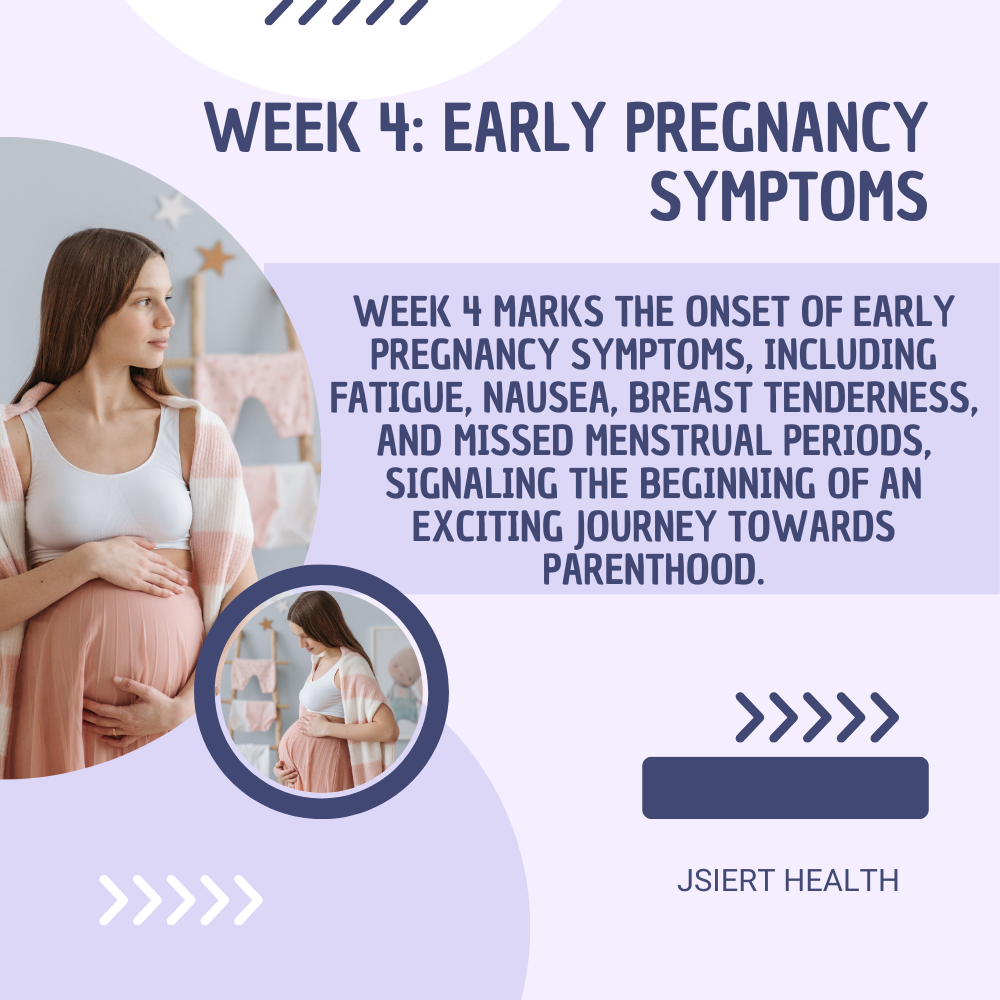
- Missed Menstrual Period:
- One of the most common early signs of pregnancy is a missed menstrual period.
- For those with regular menstrual cycles, noticing a missed period can be an indication that conception has occurred.
- Hormonal Changes Manifest:
- Week 4 is when hormonal changes become more pronounced, leading to the onset of classic pregnancy symptoms.
- These hormonal shifts play a crucial role in supporting the developing embryo and preparing the body for pregnancy.
- Fatigue:
- Many individuals experience increased fatigue during early pregnancy, often feeling more tired than usual.
- This fatigue is attributed to hormonal changes and increased metabolic demands on the body.
- Nausea and Morning Sickness:
- Nausea, commonly referred to as morning sickness, may start to manifest during Week 4.
- While it can occur at any time of the day, it’s often most pronounced in the morning.
- Breast Changes:
- Breast tenderness, swelling, or sensitivity may be noticed as hormonal fluctuations affect breast tissue.
- The nipples may also darken in color as pregnancy progresses.
- Mood Swings:
- Hormonal changes can lead to mood swings or heightened emotional sensitivity.
- Individuals may experience a range of emotions, from elation to irritability, as they adjust to the changes in their bodies.
- Confirmation of Pregnancy:
- Week 4 is a pivotal time for confirming pregnancy through home pregnancy tests or medical screenings.
- A positive pregnancy test result provides concrete evidence of pregnancy and prompts individuals to seek prenatal care.
- Emotional Adjustment:
- As early pregnancy symptoms manifest, individuals may undergo emotional adjustments as they come to terms with the reality of pregnancy.
- It’s important to approach this time with patience and self-care, acknowledging the range of emotions that may arise.
Week 5: Confirmation and Prenatal Care
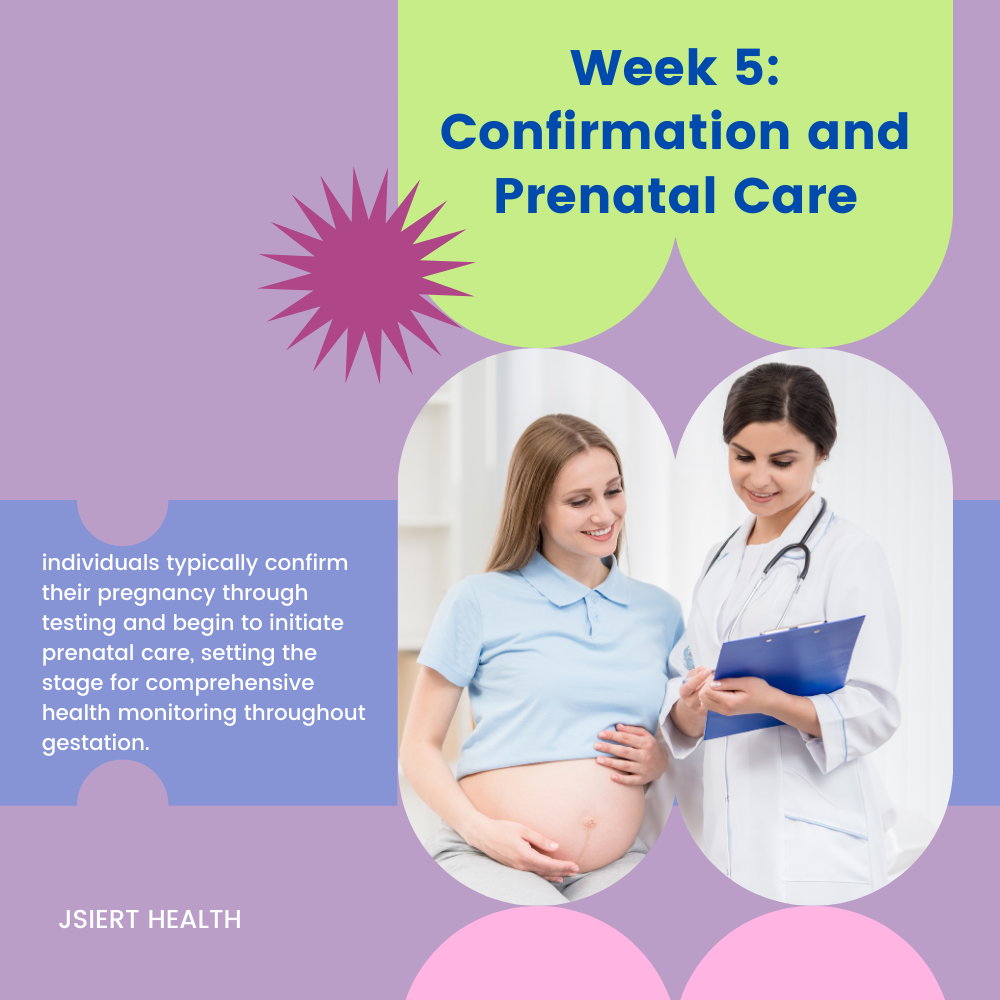
- Confirmation of Pregnancy:
- By Week 5, many individuals have confirmed their pregnancy through home pregnancy tests or medical screenings.
- A positive pregnancy test result brings a sense of certainty and prompts individuals to take proactive steps towards prenatal care.
- Initiating Prenatal Care:
- Week 5 marks the beginning of prenatal care, a crucial aspect of ensuring a healthy pregnancy.
- Scheduling appointments with a healthcare provider allows individuals to receive essential guidance and support throughout their pregnancy journey.
- Healthcare Provider Consultation:
- During prenatal care appointments, individuals have the opportunity to discuss their medical history, lifestyle factors, and any concerns or questions they may have.
- Healthcare providers offer personalized advice on nutrition, exercise, and overall prenatal health, tailoring recommendations to individual needs.
- Importance of Prenatal Vitamins:
- In Week 5, healthcare providers often recommend starting prenatal vitamins to ensure adequate intake of essential nutrients such as folic acid, iron, and calcium.
- Prenatal vitamins support fetal development and help prevent birth defects, underscoring their importance in early pregnancy.
- Tracking Pregnancy Milestones:
- As individuals embark on their prenatal care journey, they become more attuned to the milestones and changes occurring within their bodies.
- Tracking pregnancy milestones, such as fetal development and maternal health indicators, provides a sense of reassurance and connection to the growing baby.
- Emotional Preparation:
- Week 5 may bring about a range of emotions as individuals fully embrace the reality of pregnancy and the responsibilities that come with it.
- It’s essential to approach this time with positivity and a willingness to prioritize self-care and well-being.
- Partner Involvement:
- Partners play a crucial role in supporting individuals throughout the prenatal care process.
- Encouraging open communication and actively participating in prenatal appointments can strengthen the bond between partners and enhance the pregnancy experience.
Week 5 marks the transition into proactive prenatal care, setting the stage for a healthy and well-supported pregnancy journey. As individuals embark on this next phase, they gain confidence and empowerment in navigating the weeks ahead with informed guidance and support. Stay tuned as we continue to explore the subsequent weeks, unraveling the early signs and symptoms of pregnancy with clarity and insight.
Week 6: Physical Changes and Symptoms

- Growing Embryo:
- By Week 6, the embryo continues to grow rapidly, undergoing significant development in size and complexity.
- This growth spurt may trigger various physical changes and symptoms in the expectant individual.
- Breast Changes Intensify:
- Breast tenderness and swelling may become more pronounced during Week 6 as hormonal fluctuations persist.
- Individuals may notice increased sensitivity in the breasts and nipples, accompanied by occasional discomfort.
- Fatigue:
- Fatigue remains a common symptom during Week 6, with many individuals experiencing heightened feelings of tiredness.
- Hormonal changes and the body’s increased energy demands contribute to feelings of fatigue and lethargy.
- Morning Sickness:
- Morning sickness, characterized by nausea and vomiting, may escalate in Week 6 for some individuals.
- While the name suggests morning onset, symptoms can occur at any time of the day or night.
- Food Aversions and Cravings:
- Changes in taste preferences and food cravings or aversions may emerge during Week 6.
- Some individuals may develop a strong desire for certain foods while experiencing repulsion towards others.
- Increased Urination:
- The growing uterus exerts pressure on the bladder, leading to increased urinary frequency in Week 6.
- Individuals may find themselves needing to urinate more frequently, especially during the night.
- Emotional Rollercoaster:
- Hormonal fluctuations continue to influence emotions during Week 6, leading to mood swings and heightened emotional sensitivity.
- Individuals may experience a range of feelings, from joy and excitement to anxiety and irritability.
- Adjusting Lifestyle:
- Week 6 prompts individuals to make adjustments to their lifestyle to accommodate the changes associated with pregnancy.
- Prioritizing rest, maintaining a balanced diet, and staying hydrated are essential for supporting overall well-being.
- Seeking Support:
- As physical changes and symptoms intensify, seeking support from healthcare providers, partners, and loved ones becomes increasingly important.
- Open communication and proactive engagement in prenatal care contribute to a positive pregnancy experience.
Week 6 heralds significant physical changes and symptoms as the pregnancy journey progresses. By understanding and addressing these changes, individuals can navigate this transformative time with greater comfort and confidence. Stay tuned as we delve into the subsequent weeks, continuing to unravel the early signs and symptoms of pregnancy with clarity and insight.
Week 7: Hormonal Fluctuations and Emotional Well-being

- Continued Hormonal Changes:
- Hormonal fluctuations persist in Week 7, influencing various aspects of physical and emotional well-being.
- Elevated levels of progesterone and estrogen continue to support the developing pregnancy while also affecting mood and energy levels.
- Emotional Sensitivity:
- Hormonal changes during Week 7 can lead to heightened emotional sensitivity and mood swings.
- Individuals may find themselves experiencing a range of emotions, from joy and excitement to anxiety and tearfulness.
- Managing Stress:
- Week 7 prompts individuals to prioritize stress management techniques to support emotional well-being.
- Practices such as mindfulness, deep breathing exercises, and gentle physical activity can help alleviate stress and promote relaxation.
- Physical Symptoms:
- Physical symptoms such as breast tenderness, fatigue, and morning sickness may continue or intensify during Week 7.
- It’s important for individuals to listen to their bodies and prioritize self-care to manage these symptoms effectively.
- Seeking Support:
- Open communication with healthcare providers, partners, and loved ones remains essential in Week 7.
- Sharing concerns and seeking support can help individuals navigate the emotional ups and downs of early pregnancy with greater resilience.
- Bonding with Baby:
- Despite the physical and emotional changes, Week 7 presents opportunities for bonding with the developing baby.
- Taking time to connect with the pregnancy through activities such as reading, journaling, or talking to the baby can foster a sense of connection and anticipation.
- Supporting Mental Health:
- Prioritizing mental health is crucial during Week 7 and throughout pregnancy.
- Individuals should not hesitate to reach out for professional support if they experience persistent feelings of anxiety, depression, or overwhelm.
- Partner Involvement:
- Partners play a significant role in supporting emotional well-being during Week 7 and beyond.
- Offering understanding, empathy, and practical assistance can strengthen the bond between partners and enhance the pregnancy experience.
Week 7 is a time of continued hormonal fluctuations and emotional adjustment as individuals navigate the ups and downs of early pregnancy. By prioritizing self-care, seeking support, and fostering emotional resilience, individuals can promote their well-being and lay the foundation for a healthy pregnancy journey. Stay tuned as we explore the subsequent weeks, uncovering the early signs and symptoms of pregnancy with clarity and insight.
Week 8: Developing Baby and Maternal Changes
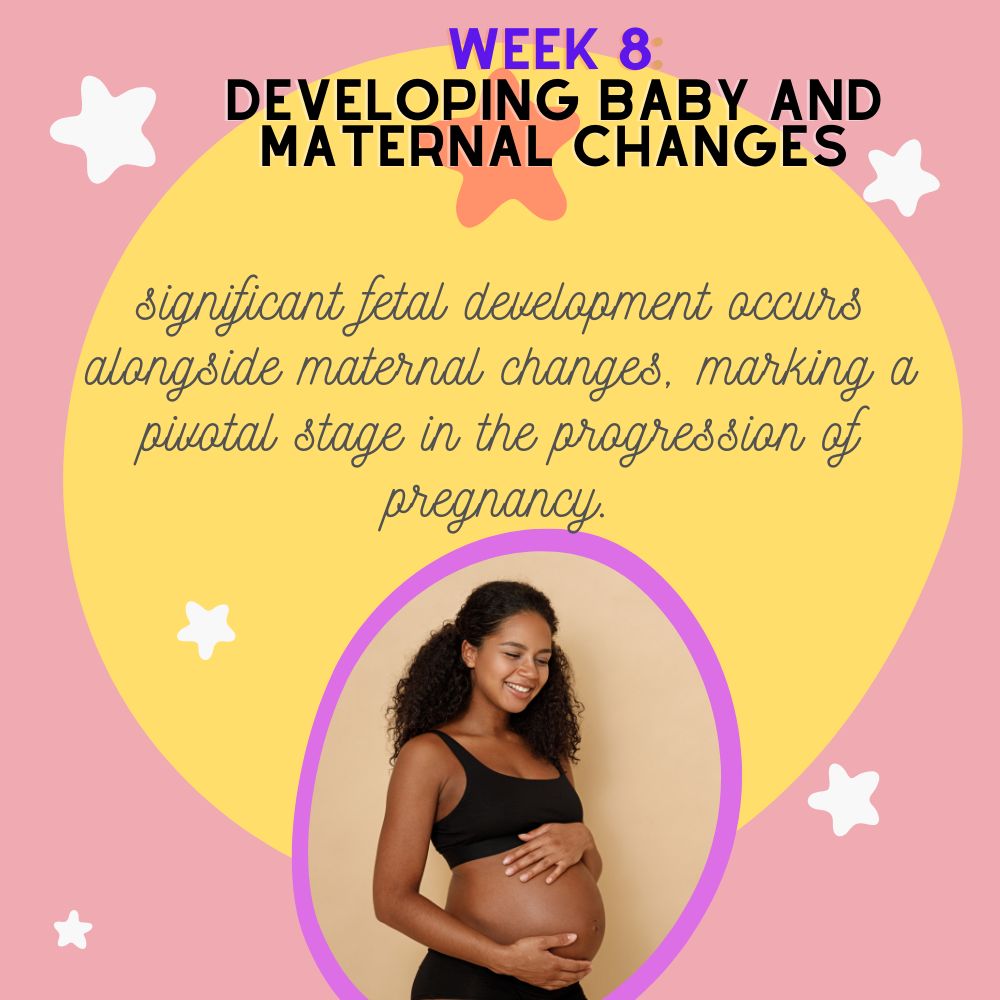
- Fetal Development Milestones:
- In Week 8, the developing baby undergoes significant growth and development.
- Vital organs, such as the heart, brain, and kidneys, continue to form, laying the foundation for the baby’s future development.
- Maternal Changes:
- As the baby grows, expectant individuals may notice changes in their bodies during Week 8.
- Symptoms such as breast tenderness, fatigue, and morning sickness may persist or intensify as hormonal fluctuations continue.
- Increased Fatigue:
- Fatigue remains a common symptom in Week 8, with many individuals experiencing heightened feelings of tiredness.
- Hormonal changes, increased metabolic demands, and the body’s efforts to support fetal development contribute to feelings of fatigue.
- Continued Breast Changes:
- Breast tenderness and swelling may persist or become more pronounced in Week 8.
- Hormonal fluctuations and increased blood flow to the breasts contribute to these changes.
- Gastrointestinal Symptoms:
- Morning sickness, characterized by nausea and vomiting, may continue in Week 8 for some individuals.
- Changes in hormone levels and increased sensitivity to certain odors can trigger or exacerbate gastrointestinal symptoms.
- Emotional Adjustment:
- Week 8 may bring about emotional adjustments as individuals come to terms with the physical and emotional changes of pregnancy.
- It’s important to acknowledge and address any feelings of anxiety, uncertainty, or overwhelm with support from healthcare providers, partners, and loved ones.
- Self-care Practices:
- Prioritizing self-care becomes increasingly important in Week 8 to support overall well-being.
- Engaging in relaxation techniques, maintaining a balanced diet, and staying hydrated can help alleviate symptoms and promote a sense of comfort.
- Prenatal Care:
- Week 8 reinforces the importance of prenatal care in monitoring the health and development of both the mother and the baby.
- Regular prenatal appointments allow healthcare providers to track progress, address concerns, and provide guidance for a healthy pregnancy.
- Partner Support:
- Partners play a crucial role in providing emotional support and practical assistance during Week 8 and throughout pregnancy.
- Offering empathy, understanding, and encouragement can strengthen the bond between partners and enhance the pregnancy experience.
Week 8 is a time of significant growth and change for both the developing baby and the expectant individual. By recognizing and addressing maternal changes, prioritizing self-care, and seeking support from healthcare providers and loved ones, individuals can navigate this stage of pregnancy with confidence and resilience. Stay tuned as we continue to explore the subsequent weeks, uncovering the early signs and symptoms of pregnancy with clarity and insight.
Week 9: Pregnancy Aches and Pains
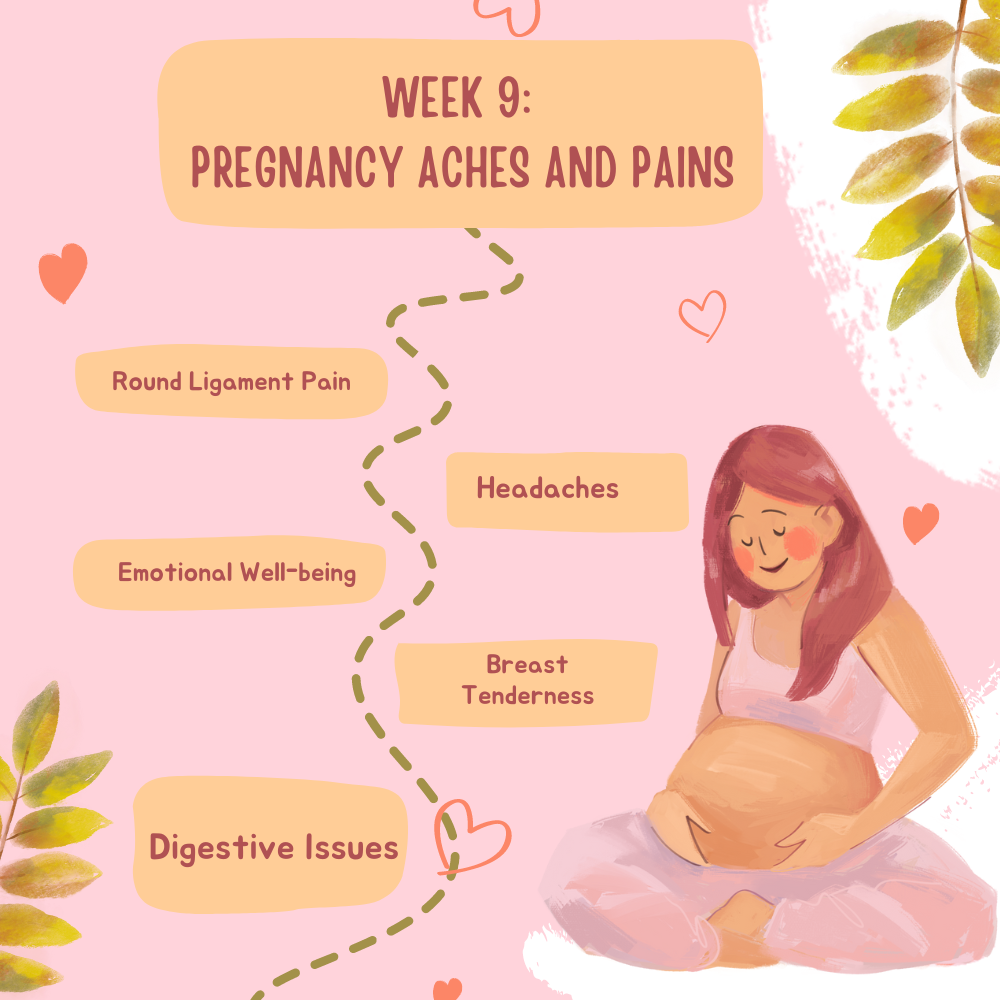
- Growing Uterus:
- By Week 9, the uterus continues to expand to accommodate the growing baby.
- This expansion may lead to various aches and pains as the uterus puts pressure on surrounding organs and ligaments.
- Round Ligament Pain:
- Round ligament pain is a common complaint in Week 9, characterized by sharp or stabbing sensations in the lower abdomen or groin.
- This discomfort occurs as the ligaments supporting the uterus stretch and expand to accommodate its growth.
- Back Pain:
- Many individuals experience mild to moderate back pain during Week 9, often attributed to changes in posture and the strain of carrying additional weight.
- Hormonal changes and the shifting center of gravity further contribute to back discomfort.
- Breast Tenderness:
- Breast tenderness may persist in Week 9 as hormonal fluctuations continue.
- The breasts may feel tender, swollen, or sensitive to touch, adding to overall discomfort.
- Digestive Issues:
- Gastrointestinal symptoms such as indigestion, bloating, and constipation may worsen in Week 9.
- Hormonal changes slow down digestion, while the growing uterus puts pressure on the digestive organs.
- Headaches:
- Headaches are a common complaint during Week 9, often related to hormonal changes, dehydration, or increased stress.
- Practicing relaxation techniques, staying hydrated, and managing stress can help alleviate headache symptoms.
- Fatigue:
- Fatigue may persist or worsen in Week 9 as the body works harder to support the growing baby.
- Adequate rest, proper nutrition, and gentle exercise can help manage feelings of tiredness.
- Emotional Well-being:
- Dealing with pregnancy-related aches and pains can take a toll on emotional well-being in Week 9.
- It’s important to practice self-care, communicate openly with healthcare providers, and seek support from loved ones to manage stress and anxiety.
- Prenatal Care:
- Week 9 underscores the importance of regular prenatal care in addressing pregnancy-related discomforts and ensuring the well-being of both the mother and the baby.
- Healthcare providers can offer guidance on managing aches and pains and provide reassurance during this stage of pregnancy.
Week 9 may bring about various aches and pains as the body adjusts to the demands of pregnancy. By recognizing these symptoms, practicing self-care, and seeking support from healthcare providers and loved ones, individuals can alleviate discomfort and promote overall well-being. Stay tuned as we continue to explore the subsequent weeks, uncovering the early signs and symptoms of pregnancy with clarity and insight.
Week 10: Nutritional Needs and Dietary Considerations
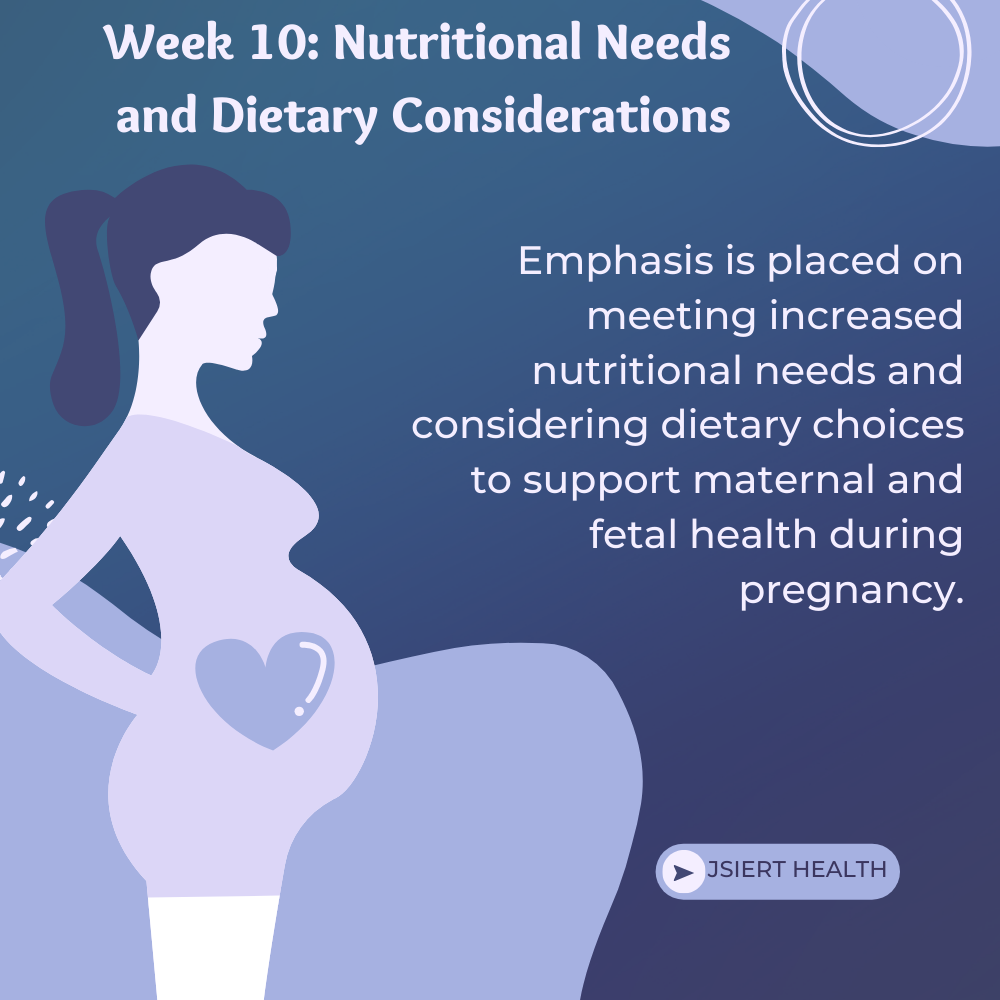
- Increased Nutritional Demands:
- By Week 10, the developing baby’s nutritional requirements continue to increase as it grows and develops.
- Expectant individuals should focus on consuming a balanced diet rich in essential nutrients to support both maternal and fetal health.
- Importance of Folic Acid:
- Folic acid remains crucial during Week 10 to support the baby’s neural tube development and prevent birth defects.
- Foods rich in folic acid include leafy greens, fortified cereals, beans, and citrus fruits.
- Iron-Rich Foods:
- Adequate iron intake is essential in Week 10 to support the increased blood volume and prevent iron-deficiency anemia.
- Iron-rich foods include lean meats, poultry, fish, beans, lentils, and fortified cereals.
- Calcium for Bone Health:
- Calcium plays a vital role in bone development for both the baby and the expectant individual in Week 10.
- Dairy products, leafy greens, tofu, almonds, and fortified juices are excellent sources of calcium.
- Omega-3 Fatty Acids:
- Omega-3 fatty acids are important for fetal brain and eye development during Week 10.
- Sources of omega-3s include fatty fish (such as salmon and trout), flaxseeds, chia seeds, walnuts, and fortified foods.
- Protein-Rich Foods:
- Protein is essential for cell growth and repair, making it crucial during Week 10 of pregnancy.
- Lean meats, poultry, fish, eggs, dairy products, legumes, nuts, and seeds are all excellent sources of protein.
- Hydration:
- Staying hydrated is important in Week 10 to support overall health and prevent dehydration.
- Aim to drink plenty of water throughout the day and limit intake of caffeinated and sugary beverages.
- Managing Nausea:
- For individuals experiencing morning sickness or nausea in Week 10, eating small, frequent meals and avoiding trigger foods may help manage symptoms.
- Ginger tea, crackers, and bland, easily digestible foods can also provide relief.
- Supplements:
- In addition to obtaining nutrients from food, some individuals may require prenatal vitamin supplements to ensure adequate intake of essential nutrients during Week 10 and throughout pregnancy.
- Healthcare providers can offer guidance on selecting appropriate supplements based on individual needs.
- Consulting Healthcare Providers:
- Week 10 is an opportune time for individuals to discuss their nutritional needs and dietary considerations with healthcare providers.
- Healthcare providers can offer personalized recommendations and address any concerns regarding diet and nutrition during pregnancy.
Week 10 emphasizes the importance of meeting increased nutritional needs and making healthy dietary choices to support both maternal and fetal health. By focusing on nutrient-rich foods, staying hydrated, managing nausea, and consulting healthcare providers, individuals can ensure they are meeting their nutritional requirements and promoting a healthy pregnancy. Stay tuned as we continue to explore the subsequent weeks, uncovering the early signs and symptoms of pregnancy with clarity and insight.
Week 11: Managing Pregnancy Symptoms
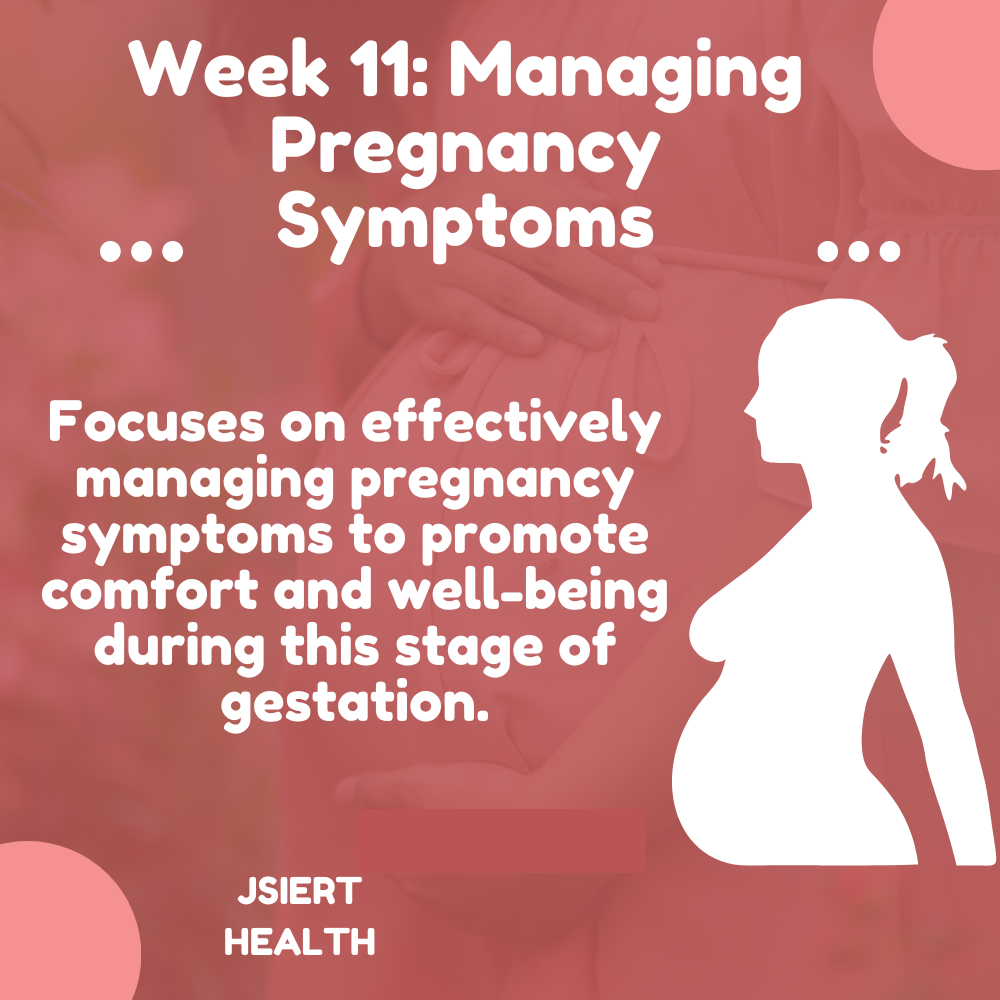
- Nausea and Morning Sickness:
- Nausea and morning sickness may continue in Week 11 for some individuals.
- Managing symptoms may involve eating small, frequent meals, avoiding trigger foods, and staying hydrated.
- Fatigue:
- Fatigue remains a common symptom in Week 11 due to hormonal changes and increased energy demands.
- Adequate rest, maintaining a balanced diet, and gentle exercise can help manage feelings of tiredness.
- Heartburn and Indigestion:
- Heartburn and indigestion may occur more frequently in Week 11 as the growing uterus puts pressure on the stomach.
- Eating smaller meals, avoiding spicy or acidic foods, and sitting upright after eating can help alleviate symptoms.
- Constipation:
- Constipation may become more noticeable in Week 11 due to hormonal changes and the pressure of the growing uterus on the digestive system.
- Increasing fiber intake, staying hydrated, and engaging in regular physical activity can help promote regular bowel movements.
- Breast Changes:
- Breast tenderness and swelling may persist in Week 11 as hormonal fluctuations continue.
- Wearing a supportive bra and avoiding harsh soaps or lotions on the breasts can help alleviate discomfort.
- Back Pain:
- Back pain may persist or worsen in Week 11 due to changes in posture and the strain of carrying additional weight.
- Practicing good posture, using supportive pillows while sitting or sleeping, and engaging in gentle stretches can help alleviate back pain.
- Headaches:
- Headaches may continue in Week 11 due to hormonal changes, dehydration, or increased stress.
- Ensuring adequate hydration, managing stress levels, and practicing relaxation techniques can help reduce headache frequency and severity.
- Emotional Well-being:
- Week 11 may bring about emotional ups and downs as individuals navigate pregnancy symptoms and the anticipation of parenthood.
- Prioritizing self-care, seeking support from loved ones, and discussing concerns with healthcare providers can help promote emotional well-being.
- Prenatal Care:
- Regular prenatal appointments are essential in Week 11 for monitoring pregnancy progress and addressing any concerns.
- Healthcare providers can offer guidance on managing pregnancy symptoms and provide reassurance throughout this stage of pregnancy.
- Partner Support:
- Partners play a vital role in providing emotional support and practical assistance during Week 11 and beyond.
- Offering empathy, understanding, and encouragement can strengthen the bond between partners and enhance the pregnancy experience.
Week 11 is a time to focus on managing pregnancy symptoms and promoting overall well-being. By implementing strategies to alleviate discomfort, seeking support when needed, and staying engaged in prenatal care, individuals can navigate this stage of pregnancy with greater comfort and confidence. Stay tuned as we continue to explore the subsequent weeks, uncovering the early signs and symptoms of pregnancy with clarity and insight.
Week 12: Transitioning to the Second Trimester
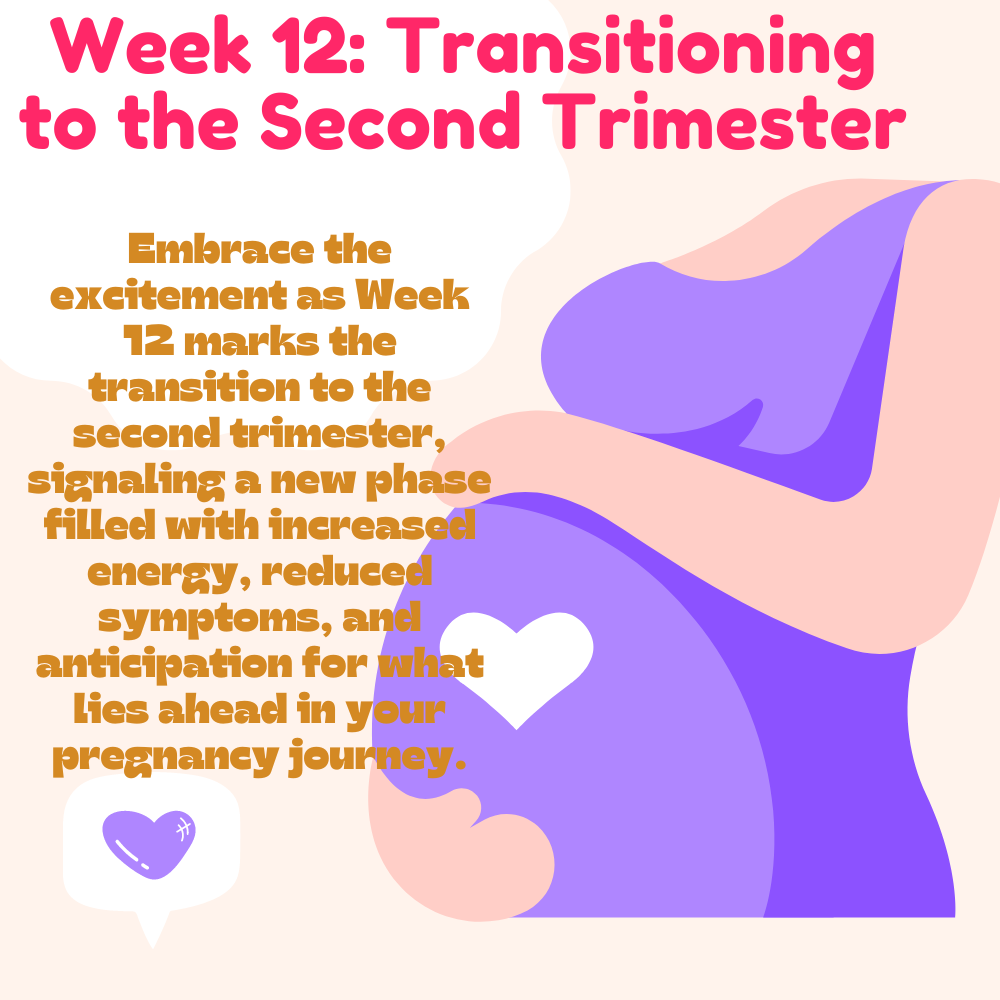
- Milestone Achievement:
- Week 12 marks a significant milestone as individuals transition from the first trimester to the second trimester of pregnancy.
- It’s a time of excitement and anticipation as the pregnancy journey progresses.
- Reduced Pregnancy Symptoms:
- Many individuals experience a reduction in pregnancy symptoms as they enter Week 12.
- Symptoms such as nausea, fatigue, and breast tenderness may begin to diminish, providing a welcome relief.
- Energy Boost:
- With the easing of pregnancy symptoms, individuals may notice an increase in energy levels in Week 12.
- This newfound energy can be harnessed to engage in activities that promote overall well-being and prepare for the upcoming trimesters.
- Growing Baby Bump:
- By Week 12, the baby bump may become more noticeable as the uterus continues to expand.
- Some individuals may start to show, while others may still have a relatively flat abdomen, depending on factors such as body type and number of pregnancies.
- Emotional Adjustment:
- Week 12 may bring about emotional adjustments as individuals reflect on the first trimester and look ahead to the remainder of the pregnancy.
- It’s common to experience a mix of emotions, including excitement, relief, and anticipation.
- Anticipating Prenatal Appointments:
- As individuals enter Week 12, they may look forward to upcoming prenatal appointments.
- These appointments provide an opportunity to check on the baby’s growth and development, as well as receive guidance on prenatal care and nutrition.
- Planning for the Future:
- Week 12 is a time for individuals to start planning for the future and making preparations for the arrival of the baby.
- This may involve setting up the nursery, researching childbirth education classes, and discussing birth plans with healthcare providers.
- Partner Involvement:
- Partners play an essential role in supporting individuals as they transition to the second trimester.
- Encouraging open communication, offering practical assistance, and sharing in the excitement of milestones can strengthen the bond between partners.
- Enjoying Pregnancy:
- Week 12 provides an opportunity for individuals to embrace and enjoy the pregnancy journey.
- Taking time to cherish special moments, connect with the growing baby, and celebrate this unique experience can foster a sense of joy and gratitude.
Week 12 marks a significant transition as individuals enter the second trimester of pregnancy. With reduced symptoms, increased energy, and a growing sense of excitement, it’s a time to embrace the journey ahead with positivity and anticipation. Stay tuned as we continue to explore the subsequent weeks, uncovering the early signs and symptoms of pregnancy with clarity and insight.
Conclusion
In conclusion, understanding the early signs and symptoms of pregnancy week by week is essential for individuals embarking on this transformative journey. By recognizing the physical, emotional, and developmental changes occurring throughout pregnancy, individuals can better prepare for the arrival of their little one and navigate the joys and challenges of pregnancy with confidence and grace. Whether you’re experiencing your first pregnancy or adding to your growing family, this comprehensive guide aims to provide the knowledge and support needed to thrive during this remarkable time in your life.
FAQ ( Frequently Asked Questions ) : Early Signs of Pregnancy: Symptoms Week by Week Guide
- What is the purpose of a week-by-week pregnancy guide?
- A week-by-week pregnancy guide provides expectant individuals with information about the changes occurring in their bodies and the development of their baby throughout each stage of pregnancy. It helps individuals understand what to expect and how to manage symptoms and concerns.
- What are early signs of pregnancy?
- Early signs of pregnancy can vary, but common symptoms include missed menstrual period, fatigue, nausea (morning sickness), breast tenderness, frequent urination, and mood swings. These symptoms typically begin to manifest within the first few weeks after conception.
- Why is it important to track pregnancy symptoms week by week?
- Tracking pregnancy symptoms week by week allows individuals to monitor their health and the progress of their pregnancy. It can help identify any concerning symptoms or complications that may arise and ensure timely intervention and appropriate prenatal care.
- When should I seek medical advice for pregnancy symptoms?
- It’s essential to seek medical advice if you experience severe or persistent symptoms such as severe abdominal pain, heavy bleeding, severe headaches, blurred vision, or signs of preterm labor. Additionally, if you have any concerns about your pregnancy or health, consulting a healthcare provider is recommended.
- What can I do to manage pregnancy symptoms?
- Managing pregnancy symptoms involves practicing self-care, maintaining a healthy lifestyle, and seeking support when needed. Strategies may include eating a balanced diet, staying hydrated, getting regular exercise, practicing relaxation techniques, and getting plenty of rest.
- How can partners support individuals experiencing early pregnancy symptoms?
- Partners can provide emotional support, assist with household tasks, accompany individuals to prenatal appointments, and educate themselves about pregnancy and childbirth. Open communication, empathy, and active involvement in the pregnancy journey can strengthen the bond between partners.
- Are there any dietary considerations during early pregnancy?
- During early pregnancy, it’s essential to focus on consuming a balanced diet rich in nutrients such as folic acid, iron, calcium, omega-3 fatty acids, and protein. Avoiding alcohol, caffeine, and certain foods that may pose risks to the developing baby is also recommended.
- How can I alleviate common pregnancy discomforts?
- Alleviating common pregnancy discomforts may involve making lifestyle adjustments, such as practicing good posture, using supportive pillows, eating small, frequent meals, and staying hydrated. Over-the-counter remedies or medications may also provide relief, but it’s important to consult a healthcare provider before taking any medication during pregnancy.
- What resources are available for additional support and information during pregnancy?
- Additional support and information during pregnancy can be found through healthcare providers, prenatal classes, online forums, pregnancy apps, books, and reputable websites dedicated to pregnancy and childbirth. Joining a support group or connecting with other expectant individuals can also provide valuable support and guidance.
REFERENCES :
If you’re looking for information on early signs of pregnancy and a week-by-week guide to symptoms, you can refer to a variety of reputable sources, including:
- Websites and Health Portals:
- Books:
- “What to Expect When You’re Expecting” by Heidi Murkoff and Sharon Mazel.
- “The Pregnancy Countdown Book: Nine Months of Practical Tips, Useful Advice, and Uncensored Truths” by Susan Magee and Kara Nakisbendi, M.D.
- Healthcare Provider Websites:
- Planned Parenthood (https://www.plannedparenthood.org/learn/pregnancy)
- NHS (National Health Service) UK (https://www.nhs.uk/pregnancy/)
- Apps:
- Ovia Pregnancy Tracker & Baby Countdown App
- Glow Nurture Pregnancy Tracker App
- Scientific Research and Journals:
- PubMed (https://pubmed.ncbi.nlm.nih.gov/)
- Obstetrics & Gynecology journal (https://journals.lww.com/greenjournal/pages/default.aspx)
- The American Journal of Obstetrics & Gynecology (https://www.ajog.org/)
- Online Communities and Forums:
- BabyCenter Community (https://community.babycenter.com/)
- The Bump Community (https://community.thebump.com/)
These resources provide detailed information on the signs and symptoms of pregnancy, often categorized week by week, helping individuals understand what to expect during each stage of early pregnancy. It’s important to note that while these resources can be informative, consulting with a healthcare provider is always recommended for personalized advice and guidance.